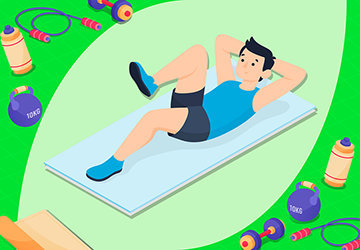How to Maintain a Healthy Work Life Balance
Maintaining a healthy work-life balance can be difficult in this fast-paced modern life. We know that balancing a demanding career, fulfilling relationships, and prioritizing self-care can be challenging for most of us. Work-life balance is essential to living a happy life and achieving optimal physical and mental health.
Welcome to our lifestyle blog, where we share your secrets to success in all areas of your life. Let's discuss some strategies and practical tips for a better work-life balance.

Set clear boundaries
One of the best tips for maintaining a healthy work-life balance is balancing work and personal life. Setting boundaries is an essential aspect of a healthy lifestyle. Here are some practical ways to set boundaries and protect your health:
· Define your working hours and stick to them
· Avoid work-related phone calls or emails outside of scheduled business hours
· Set up a dedicated workspace at home to minimize distractions
· Let your colleagues and family know your boundaries
By setting and respecting boundaries, you can effectively separate work and personal life, resulting in a healthier, more balanced lifestyle. This reduces stress and prevents burnout, allowing you to thrive professionally and personally.
Prioritize your time
We understand the importance of effective time management for people with busy schedules. If you're looking to optimize time, consider the following strategies:
· Set daily, weekly, and monthly goals
· Break down tasks into smaller, manageable steps
· Use a planner or digital calendar to stay organized
· Delegate or outsource tasks where possible
By mastering the art of time management, you can optimize your productivity and free up time for leisure activities and self-care.
Learn to say "no."
Overcommitting can be bad for your overall health. Saying no to extra responsibilities or community involvement can help you maintain a healthy work-life balance and avoid burnout. Self-care should not be considered an option but a priority. You need to know that setting boundaries and prioritizing self-care is okay. So don't be afraid to politely decline the promise of an extra when your plate is full. Your happiness should always come first. It's important to remember that saying "no" to an invitation or request doesn't make you a lousy colleague or friend. Instead, it shows that you value your happiness and consciously prioritize it.
Make time for self-care
Taking care of yourself is essential to developing and maintaining good physical and mental health. It's important to prioritize self-care and incorporate activities that promote relaxation and rejuvenation into your routine. Consider simple but effective practices such as:
· Participate in regular exercise
· Practice meditation or mindfulness techniques
· Enjoy hobbies and creative pursuits
· enough sleep

Develop strong relationships
Work-life balance can improve our well-being and lead to a more fulfilling life. We highly recommend prioritizing quality time with loved ones. Whether a weekly dinner or a weekend getaway, making time for friends and family is critical to maintaining strong relationships and fostering a sense of togetherness. So set aside some much-needed bonding time and cherish your time with those closest to you. You can do this by:
· Plan regular meetings and travel
· Prioritize quality time over quantity
· Appreciate and thank them for their support
Building solid relationships is an excellent recipe for a better work-life balance and stress relief.
Unplug and disconnect
In the age of modern technology, it can be challenging to detach from work and enjoy personal time without interruption. Here are some strategies that can help you maintain this balance:
· Regularly schedule “no tech” time
· Disable notifications outside of business hours
· Use an “out of office” email responder while on vacation
By disconnecting, you can focus on activities that bring you joy and relaxation, such as spending time with loved ones, pursuing hobbies, or simply enjoying some quiet alone time.
Embrace flexibility
Incorporating a flexible mindset into your daily life can be a game-changer as you navigate unexpected twists and turns. This will significantly help you maintain your sense of balance. Catch:
· Negotiate flexible working hours or telework arrangements
· Set realistic expectations and adjust goals as needed
· Open to change and new opportunities
A healthy work-life balance can be achieved by quickly adapting and responding to challenges.
Seek support
There is no shame in asking for help when you need it. Relying on those closest to us, we can find the strength and encouragement to overcome our challenges.
So don't hesitate to contact someone who cares about you. Encouraging open communication and sharing personal stories is another helpful tip for maintaining a healthy work-life balance. By sharing your struggles and successes, you inspire and inspire those around you while showing them you are human and relevant.
Plus, advice from a licensed therapist or counselor can benefit your overall health. Prioritizing your mental health and seeking professional support when needed is essential. With the right help, methods, and strategies, you can effectively manage stress, anxiety, and other challenges that affect your work-life balance. Consider contacting a psychologist for advice and support.
Diploma
A harmonious balance between work and private life is essential for a fulfilling and satisfying lifestyle. While this may seem daunting, it's vital to your health and well-being. Living a balanced lifestyle takes time and effort; success depends on being flexible and seeking support. By following these tips for maintaining a healthy work-life balance, you can create a lifestyle that works for you.
Achieving balance in life is a personal journey that varies from person to person. Finding out what works best for you and your unique situation is critical. By incorporating these practical tips and strategies into your everyday life, you can succeed personally and professionally and live a happier and more fulfilling lifestyle.







